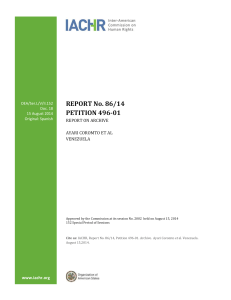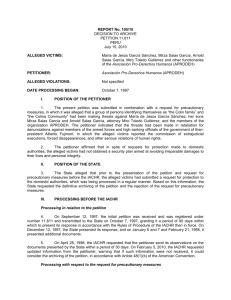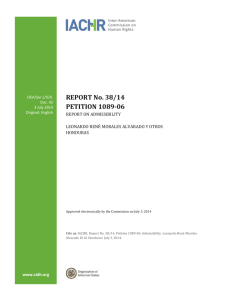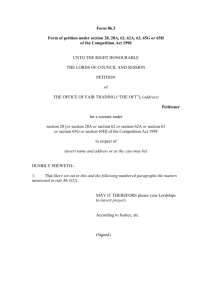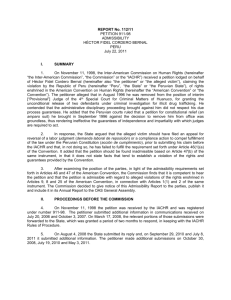Report No. 83/12 - Organization of American States
advertisement
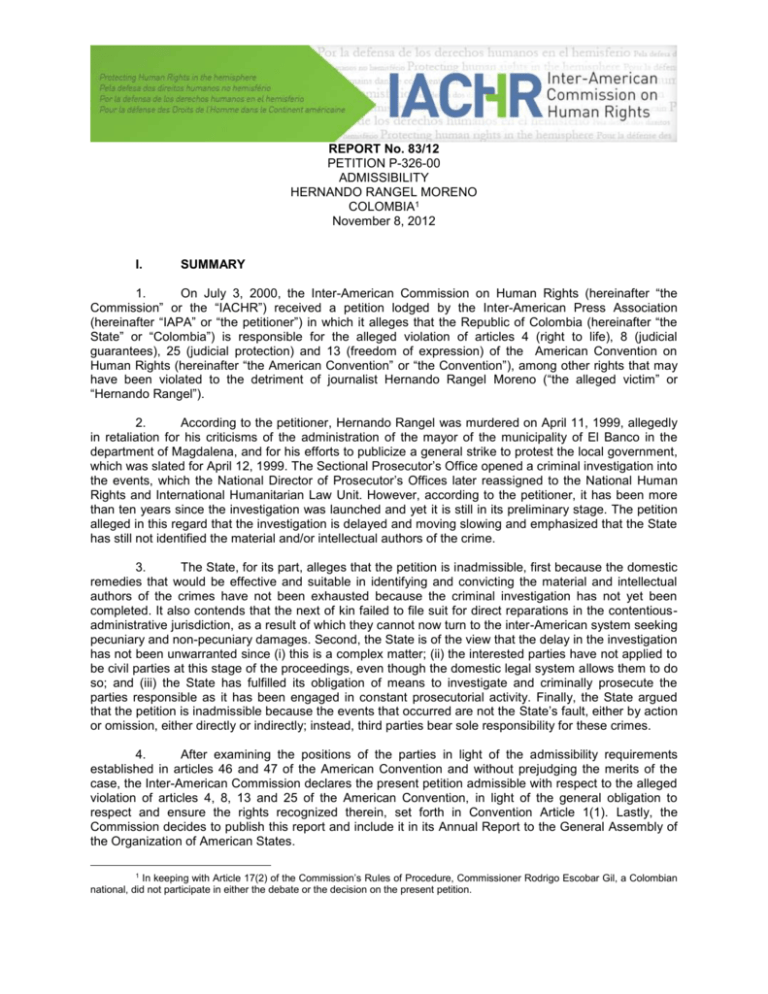
REPORT No. 83/12 PETITION P-326-00 ADMISSIBILITY HERNANDO RANGEL MORENO COLOMBIA1 November 8, 2012 I. SUMMARY 1. On July 3, 2000, the Inter-American Commission on Human Rights (hereinafter “the Commission” or the “IACHR”) received a petition lodged by the Inter-American Press Association (hereinafter “IAPA” or “the petitioner”) in which it alleges that the Republic of Colombia (hereinafter “the State” or “Colombia”) is responsible for the alleged violation of articles 4 (right to life), 8 (judicial guarantees), 25 (judicial protection) and 13 (freedom of expression) of the American Convention on Human Rights (hereinafter “the American Convention” or “the Convention”), among other rights that may have been violated to the detriment of journalist Hernando Rangel Moreno (“the alleged victim” or “Hernando Rangel”). 2. According to the petitioner, Hernando Rangel was murdered on April 11, 1999, allegedly in retaliation for his criticisms of the administration of the mayor of the municipality of El Banco in the department of Magdalena, and for his efforts to publicize a general strike to protest the local government, which was slated for April 12, 1999. The Sectional Prosecutor’s Office opened a criminal investigation into the events, which the National Director of Prosecutor’s Offices later reassigned to the National Human Rights and International Humanitarian Law Unit. However, according to the petitioner, it has been more than ten years since the investigation was launched and yet it is still in its preliminary stage. The petition alleged in this regard that the investigation is delayed and moving slowing and emphasized that the State has still not identified the material and/or intellectual authors of the crime. 3. The State, for its part, alleges that the petition is inadmissible, first because the domestic remedies that would be effective and suitable in identifying and convicting the material and intellectual authors of the crimes have not been exhausted because the criminal investigation has not yet been completed. It also contends that the next of kin failed to file suit for direct reparations in the contentiousadministrative jurisdiction, as a result of which they cannot now turn to the inter-American system seeking pecuniary and non-pecuniary damages. Second, the State is of the view that the delay in the investigation has not been unwarranted since (i) this is a complex matter; (ii) the interested parties have not applied to be civil parties at this stage of the proceedings, even though the domestic legal system allows them to do so; and (iii) the State has fulfilled its obligation of means to investigate and criminally prosecute the parties responsible as it has been engaged in constant prosecutorial activity. Finally, the State argued that the petition is inadmissible because the events that occurred are not the State’s fault, either by action or omission, either directly or indirectly; instead, third parties bear sole responsibility for these crimes. 4. After examining the positions of the parties in light of the admissibility requirements established in articles 46 and 47 of the American Convention and without prejudging the merits of the case, the Inter-American Commission declares the present petition admissible with respect to the alleged violation of articles 4, 8, 13 and 25 of the American Convention, in light of the general obligation to respect and ensure the rights recognized therein, set forth in Convention Article 1(1). Lastly, the Commission decides to publish this report and include it in its Annual Report to the General Assembly of the Organization of American States. 1 In keeping with Article 17(2) of the Commission’s Rules of Procedure, Commissioner Rodrigo Escobar Gil, a Colombian national, did not participate in either the debate or the decision on the present petition. 2 II. PROCESSING WITH THE INTER-AMERICAN COMMISSION 5. The Commission received the petition on July 3, 2000. On July 27, 2000, the Commission requested additional information from the petitioner concerning the exhaustion of domestic remedies. On January 13, 2009, the petitioner asked the Commission to grant it an extension so that it might present up-to-date information on the matter of exhaustion of domestic remedies. On February 2, 2009, the IACHR requested information from the petitioner concerning the current status of the criminal investigation that had reportedly been launched into the death of journalist Hernando Rangel, and any other remedy that may have been filed within that process. On February 4 and April 3, 2009, the petitioner sent information on the requested matter. 6. On June 3, 2009, the Commission began the formal processing of the petition and on June 5 of that year forwarded the pertinent parts of the petition to the State with the request that it present its response within two months from the date of the Commission’s communication. On August 5, 2009, the State presented its response to the petition, the pertinent parts of which were forwarded to the petitioner on August 26, 2009. 7. The petitioner presented additional observations on November 30, 2009. For its part, the State sent additional observations on July 9, 2010. These communications were duly transmitted to the respective counterparty. III. POSITIONS OF THE PARTIES A. The petitioner 8. In its petition, the petitioner organization alleged that independent journalist Hernando Rangel Moreno was murdered on April 11, 1999, in the municipality of El Banco Magdalena, presumably because of his editorial style of journalism in which he encouraged, inter alia, civil protest and general strikes against the administration of local mayor Fidias Zeider Ospino. The petitioner indicated that at the time of his murder, the alleged victim was working as a reporter and director of the publications Magdalena 30 días, Sur and Región; since early January 1999, he had been promoting a general strike against the local government, which was scheduled to take place on April 12, 1999. 9. According to the petitioner, the journalist had allegedly subscribed to the same political school of thought as the mayor; the latter had even financed two of the alleged victim’s publications, the second one of which concerned the achievements of his administration and was published in December 1998. However, the petitioner alleged that in his publication Región, the title on the first page was as follows: “Profound Crisis in Municipal Government.” 10. The petitioner observed that prior to the alleged victim’s murder, Mayor Ospino was suspended from office twice: the first time on November 12, 1998, on charges of a series of irregularities in government contracting, and then again on February 1, 1999, this time by order of the Office of the Attorney General of the Nation. When the second suspension happened, Mayor Ospino was temporarily replaced by Mr. Francisco Pisciotti. The petitioner, however, stated that Pisciotti’s relationship with Ospino deteriorated when Ospino resumed his functions as mayor and terminated a protégé of Pisciotti, firing him from his post as director of Public Enterprise. As a result, Pisciotti became one of the organizers of the protests against Ospino, together with the alleged victim and Nhora Ospino, Luis Fernando Venegas, Rosario Martínez, journalist Gustavo Reyes, Elías Bolaños, Ramiro Morón, Álvaro Padilla, Argemiro Rojas and Jorge Beleño. 11. The petitioner’s contention was that in March 1999, the streets of the town began to be filled with graffiti alluding to the mayor as “Fidias rata, Fidias asesino” [Fidias the Rat, Fidias the Murderer]. It was then that a group of the town’s leading figures met to call a general strike to protest the administration of Mayor Ospino. The petitioner also states that one of the rumors circulating in town at the time concerned a death list with the names of the organizers of the general strike. In response, on April 8, 3 1999, Pisciotti sent a letter to Mayor Ospino “where he warned him of a possible attempt and held him responsible for whatever happened.” The petitioner also alleged that when the graffiti attacking the mayor appeared around town, the organizers of the general strike started to receive threats of various kinds: Nhora Ospino was forced to move; Argemiro Rojas was followed; Gustavo Reyes was accused of being an informant for the guerrilla movement, and Hernando Rangel was murdered. 12. The petitioner stated that at around 6:00 p.m. on April 11, 1999, the alleged victim was at the Los Moralitos kiosk, with Álvaro Padilla, Ramiro Morón and Jorge Beleño (who ran the place). They were finalizing the details for the general strike set to take place the following day. The petitioner observes that Mayor Ospino arrived on the scene, looking for Jorge Beleño. The mayor warned him to abandon plans for the general strike and told him to “Switch sides, because otherwise, you’re marking the skull and crossbones [a sign of danger].” He also allegedly subjected Beleño to questioning. The petitioner reported that the alleged victim then went to the home of Álvaro Padilla; Ospino arrived later and dropped off Beleño. The petitioner indicated that Beleño did not remain at Padilla’s house; he left the place without telling anyone about the threats and intimidation. According to the petitioner, that same night “a man came to Padilla’s house and shot Rangel.” The petitioner indicated that the man approached him from behind and shot him four times in the head, and then fled the scene. The bullets perforated the alleged victim’s larynx and jugular vein; death was instantaneous. 13. The petitioner also maintained that on the same night, April 11, 1999, Mayor Ospino’s chauffeur, Jaime Pérez Ospino and three other people were in a vehicle belonging to city hall when they threatened Elías Bolaños for organizing the protest, which in the end never took place. The petitioner also stated that persons identified as paramilitaries killed three other citizens that same night: Suraya Namen, Lucco Beleño and Sai Namen. 14. According to the petitioner, on December 7, 1999, the Attorney General’s Office ordered that Mayor Fidias Zeider Ospino be taken into custody as the suspected mastermind of the alleged victim’s murder and that on January 6, 2000, an order was issued for his preventive detention. The petitioner also reported that at the time charges were brought against the mayor, he had been suspended yet again for irregularities in government contracting, by virtue of a measure taken by the Office of the Attorney General on October 12, 1999. The petitioner reported that the mayor was incarcerated until March 10, 2000, the date on which he was released for lack of evidence and resumed his functions as mayor of El Banco Magdalena. The petitioner contends that the decision of the Attorney General’s Office was based on the defense’s theory that “Pisciotti had sacrificed his journalist friend’s life in order to incriminate the mayor” and that the evidence presented to support that argument was “the journalist’s relationship with his client.” In response, the petitioner argued that both the journalist’s brother, Napoleón Rangel, and his wife Nancy Blanquiset Gutiérrez have maintained that the journalist “was an enemy of the Ospino administration and that he was even one of the organizers of the general strike.” 15. The petitioner maintained that the case went to the Office of the Attorney General in July 1999 and that from April to July, it was in the hands of El Banco Magdalena Sectional Prosecutor 23 and two other local prosecutors. The petitioner contends that the first of these was accused of negligence and unwarranted delay in the case by the Attorney General herself in Bogotá. 16. The petitioner also observed that between July and November 1999, the wife of the alleged victim contacted the Vice President of IAPA in Colombia, Enrique Santos Calderón, who contacted the Deputy Attorney General of the Nation, Jaime Córdoba. The latter subsequently referred the case to the Human Rights Unit in the Office of the Attorney General. The petitioner indicated that within one month of Mr. Ospino’s release, the Human Rights Unit of the Office of the Attorney General was preparing a mission to travel to El Banco Magdalena to collect new evidence. 17. In its observations dated November 30, 2009, the petitioner took issue with the State’s claim to the effect that the investigative work done by the authorities had been intensive and diligent; the account of procedural acts provided by the State would indicate otherwise, as demonstrated by the fact that, inter alia, the Attorney General’s office listed Ospino as a suspect in the investigation until August 2008, when it closed the case file. The investigation came to a formal close on December 18, 2008, and 4 cleared Ospino’s name. The petitioner argued that for nine years the Office of the Attorney General of the Nation did not move the case beyond the examining phase and never ordered a single substantive measure; the case was only brought to life because of relentless pressure from the petitioner. The petitioner asserted that the remedies filed with the Colombian courts have been ineffectual, as ten years have passed and not one of those responsible has been identified; the only suspect identified in the case was exonerated. 18. Finally, the petitioner alluded to the fact that no one had ever been prosecuted and punished for the alleged victim’s murder, which merely encouraged the commission of other crimes, such as the murder of Álvaro Alonso Escobar two years later. He had reportedly replaced Hernando Rangel as owner of Región, a weekly publication. The petitioner alleged that there is a pattern of impunity with respect to the murders of journalists in Colombia. According to the petitioner, no one has ever been made to answer for over 70% of the crimes committed in Colombia in the last 15 years (1993-2008) and none of the masterminds have ever been convicted and imprisoned. The petitioner also stated that 19.2% of the cases end in verdicts of acquittal. The petitioner underscored the fact that, with the exception of those few cases where the material authors were convicted, no one has been made to answer for the crimes committed in most of the cases. 19. Based on these considerations, the petitioner concluded that the State is responsible for violation of articles 4, 8, 13 and 25 of the American Convention, among others that may have been violated. B. The State 20. The State requested that the petition be declared inadmissible on several grounds: (i) the internal remedies that are suitable and effective for identifying, prosecuting and convicting the material and intellectual authors of the facts recounted in the petition have not been exhausted and there has been no unwarranted delay in rendering a final judgment under the available remedies, which means that the exception allowed under Article 46(2)(c) of the American Convention does not apply, and (ii) the petition does not state facts that tend to establish a violation for which the State is responsible, either by action or omission, either directly or indirectly, as the facts recounted in the petition are clearly the responsibility of third parties. 21. The State argued first that the IACHR had an obligation to forward the petition to the State within a reasonable period of time; that the IACHR should process the complaints swiftly, all the time observing the principle of a reasonable period of time, as the violation of that principle could affect the victims’ rights. Accordingly, the State asked the Commission to explain the reasons why it delayed almost nine years before transmitting the complaint in the present case to the State. 22. When it made reference to the remedies under domestic law, the State observed that the criminal investigation of the events that gave rise to this petition is currently underway, as case 524 with the Ninth Prosecutor’s Office in the National Human Rights and International Humanitarian Law Unit in the Office of the Attorney General of the Nation. It asserted that the investigation was launched on April 13, 1999 at the initiative of the El Banco Magdalena Sectional Prosecutor’s Office, and subsequently assigned to the National Human Rights and International Humanitarian Law Unit by a decision of the National Director of Prosecutor’s Offices. The State also provided a list of the measures taken in the investigation between 1999 and 2009, emphasizing that the investigative work done by the authorities has been intensive and diligent. 23. The State’s contention was that in the present case the internal remedies that are suitable and effective for resolving the alleged violation have not been exhausted. It observed that the criminal investigation into the journalist’s death is an adequate and effective remedy for resolving the violation of the rights that the petitioner is claiming, specifically the rights protected under articles 4 (right to life) and 13 (freedom of expression) of the American Convention. 5 24. The State argued that despite the fact that the investigation prosecuted by the Office of the Attorney General of the Nation has thus far been unable to identify the guilty parties, it has been conducted with diligence, and that it is self-evident that the judicial authorities are and will always be constantly engaged. This is not, therefore, a case of an unwarranted delay in the investigation. The State pointed out that according to the standard set by the Inter-American Court itself, three elements have to be considered to determine whether the time taken to conduct the criminal investigation in this case has been reasonable: a) the complexity of the case; b) the interested party’s procedural activity, and c) the conduct of the judicial authorities. 25. The State argues that the investigation into the present case is a complex undertaking, as the townspeople have not been very cooperative in providing information as to the possible motives for the crime for fear of reprisals, “especially given the political interests surrounding the administration of Fidias Ospino Fernández, the town mayor at the time of the events.” According to the State, at the time of the events in the case, the political climate in the town was extremely polarized, as a general strike was being organized against Mayor Ospino; the testimony gathered by the Attorney General’s Office regarding the alleged victim’s position with respect to the mayor was conflicting. While some portrayed him as one of the protest organizers, others claimed that the two were friends and had no idea that Hernando Rangel was in any way involved in organizing the general strike. 26. The State established that Ospino was suspected of the journalist’s murder. He was placed in preventive detention by virtue of a January 5, 2000 order, which was rescinded on March 6, 2000; the investigation against him was precluded on December 18, 2008 on the grounds that the evidence against him was not sufficient to infer his degree of involvement and responsibility in the alleged victim’s murder. According to the State, “the complex scenario in which the events unfolded has affected the course of the investigation and despite the extensive investigative work done by the competent authorities, those responsible for the murder have not yet been identified and punished.” 27. As for the procedural activity of the interested party, the State’s contention was that the alleged victim’s next of kin did not file any request to become a civil party to the criminal case underway; the State asked the Commission “to invite the petitioner to avail itself of this important remedy to add the impetus that the victim’s next of kin want to see in the domestic proceedings.” It argued that thanks to the jurisprudence of the Colombian Constitutional Court, in those cases in which the investigation is still in the preliminary phase and has not managed to identify suspects in the case, interested parties may file an application to be named a civil party at this stage of the proceedings; the reasoning is that as a party to the proceedings, the interested civil party is seeking not just damages, but also to exercise his or her right to the truth and to justice. In effect, the State asserted that the decision on the part of the Office of the Attorney General of the Nation to terminate the investigation against Mr. Ospino could have been challenged by the parties to the proceedings, including the civil party, had anyone applied to be named a civil party; however, the decision to close the case against Mr. Ospino became final when it was not challenged. 28. As for the conduct of the judicial authorities, the State argued that they have been pursuing this case relentlessly. It underscored the fact that the State’s obligation to investigate, like its obligation to prevent, is one of means and not results, and its purpose is to ensure that a State prosecutes an investigation with a sense of seriousness and impartiality, but in no sense implies an obligation to find the responsible party at all costs. The State’s contention was that the passage of time cannot, by itself, be regarded as a violation of the reasonable-time principle and that there is no evidence in the present case suggesting a lack of diligence or disregard of any guarantee to which those affected by the alleged victim’s murder are entitled. 29. The State further alleged that the affected parties did not file suit in the contentiousadministrative jurisdiction seeking direct reparations. The State explained that the purpose of such an action is to redress damages caused by omissions or actions attributable to agents of the Colombian State. The State argued that if the affected parties believed the alleged victim’s death was attributable to the action or omission of State agents, an action in the contentious-administrative jurisdiction was the proper remedy to obtain reparations. It also argued that affected parties have two years in which to avail 6 themselves of this remedy, after which it is time barred; the affected parties’ failure to avail themselves of that remedy within the prescribed time period is understood as a tacit waiver of the right to obtain pecuniary damages in the domestic legal system. The failure to file the remedy seeking direct reparations in the contentious-administrative jurisdiction should preclude any possibility that the alleged victims would obtain standing to seek compensation for pecuniary and non-pecuniary damages by way of the interAmerican system. 30. Finally, the State made reference to the characterization of the acts alleged to have violated the Convention, and argued that for the Commission to declare a petition admissible, the petition must state facts that tend to establish a violation of the rights guaranteed by this Convention. The State argued that this conditio sine qua non is not present in the instant case. According to the State, as there was no evidence suggesting that threats were made against the journalist or that he was in danger, the State cannot be said to have failed in its duty to protect Mr. Hernando Rangel. It also argued that as this was an entirely unforeseeable event, there was no reasonable chance the State could have prevented it; hence, the State cannot be held indirectly responsible (for the acts of third parties) for violation of the rights recognized in articles 4 and 13 of the American Convention, as this was not a case of the State’s lack of due diligence in preventing a human rights violation. 31. Based on the foregoing considerations, the State is requesting that the IACHR declare this petition inadmissible, as it fails to meet the requirements set forth in Article 47, subparagraphs (a) and (b) of the American Convention. IV. ANALYSIS OF COMPETENCE AND ADMISSIBILITY A. The Commission’s competence ratione materiae, ratione personae, ratione temporis and ratione loci 32. Under Article 44 of the American Convention and Article 23 of the IACHR’s Rules of Procedure, the petitioner has locus standi to file petitions with the Inter-American Commission. As for the State, Colombia is a state party to the American Convention and therefore is internationally answerable for any violations of that instrument. The alleged victim is a natural person whose rights under the American Convention the State pledged to ensure. Hence, the Commission is competent ratione personae to examine the petition. 33. The IACHR is competent ratione materiae because the petition alleges possible violations of human rights protected under the American Convention. The Commission also notes that Colombia has been a State party to the Convention since July 31, 1973, the date on which it deposited its instrument of ratification. Hence, the Commission is competent ratione temporis to examine the petition. 34. Finally, the Inter-American Commission is competent ratione loci to examine the petition because it alleges violations of Convention-protected rights said to have occurred within Colombian territory. B. Other admissibility requirements 1. Exhaustion of domestic remedies 35. Article 46(1)(a) of the American Convention provides that in order for a petition filed with the Inter-American Commission under Article 44 of the Convention to be admissible, the remedies under domestic law must have been pursued and exhausted in accordance with generally recognized principles of international law. The purpose of this requirement is to give the national authorities an opportunity to take cognizance of the alleged violation of a protected right and, if appropriate, resolve the matter before it is brought to the attention of an international body. 36. The requirement of prior exhaustion applies when the national system affords remedies that are suitable and effective for remedying the alleged violation. Here, Article 46(2) provides that the 7 requirement shall not apply (i) when the domestic legislation of the state concerned does not afford due process of law for the protection of the right or rights that have allegedly been violated; or (ii) the party alleging violation of his rights has been denied access to the remedies under domestic law or has been prevented from exhausting them; or (iii) there has been unwarranted delay in rendering a final judgment under the aforementioned remedies. 37. As the Commission has observed, in order to examine compliance with the rule requiring exhaustion of domestic remedies, a determination has to be made as to which remedy is the suitable one that has to be exhausted given the circumstances of the case; the suitable remedy is understood to be the one that can resolve the violated right. 2 In the case of alleged arbitrary deprivation of the right to life, the suitable remedy is the investigation and criminal case that the State opens and moves forward on its own initiative, for the purpose of identifying and punishing those responsible. 3 38. The precedents established by the Commission recognize that when a crime automatically prosecuted by the State is committed, the State has an obligation to set the criminal process in motion and move it forward 4 and that in such cases, this is the suitable avenue to investigate the facts, prosecute those responsible and establish the penalties that the law prescribes; it also makes other pecuniary means of reparation possible. The IACHR considers that the facts alleged in the present case suggest a violation of such fundamental rights as the right to life, which under domestic law is a crime prosecuted automatically by the State; hence, it is this process, set in motion and driven by the State, that must be considered for purposes of determining the admissibility of the petition. The Commission also observes that the remedy of direct reparations is not a suitable or sufficient avenue for prosecuting and punishing human rights violations and making the necessary reparations; therefore, it is not a suitable remedy and need not be exhausted. 39. The Commission must, therefore, examine whether the State incurred an unwarranted delay in the criminal investigation into the present case and, if so, whether the exception established in Article 46(2)(c) applies. 40. The petitioner alleged that in the present case, there was an unwarranted delay in the criminal investigations and that the exception to the rule requiring exhaustion of domestic remedies applies. It states in this regard that more than 12 years have passed, and yet the State has not even managed to identify the responsible parties. 41. The State, for its part, argued that the investigative body has acted with diligence and without interruption, and there has been no unwarranted delay in the criminal investigation. Here, the State pointed out that (i) this is a complex matter; (ii) the interested parties have not applied to be civil parties at this stage of the proceedings, even though the domestic legal system allows them to do so; and (iii) the State has fulfilled its obligation of means to investigate and criminally prosecute the parties responsible as it has prosecuted this case relentlessly. 42. The IACHR considers that the determination as to whether the exceptions to the rule requiring exhaustion of domestic remedies apply to the case at hand must be done prior to and separate from its analysis of the merits, as it hinges on a standard of assessment that is different from the one 2 IACHR. Report No. 23/07. Eduardo José Landaeta Mejías and others. Petition 435-2006. Admissibility. March 9, 2007. Paragraph 43. 3 IACHR. Report No. 23/07. Eduardo José Landaeta Mejías and others. Petition 435-2006. Admissibility. March 9, 2007. Paragraph 43; IACHR. Report No. 15/06. María Emilia González, Paula Micaela González and María Verónica Villar. Petition 61801. Admissibility. March 2, 2006. Paragraph 34; IACHR. Report No. 52/97. Case 11.218. Arges Sequeira Mangas. Annual Report 1997. Paragraphs 96 and 97. See also Report No. 55/97. Paragraph 392 and Report No. 55/04. Paragraph 25. 4 Report No. 52/97, Case 11.218, Arges Sequeira Mangas, Nicaragua, IACHR Annual Report 1997, paragraphs 96 and 97. See also: Report No. 55/97, Case 11.137, Juan Carlos Abella, Argentina, paragraph 392. Report No. 62/00, Case 11.727, Hernando Osorio Correa, Colombia, Paragraph 24. IACHR Annual Report 2000. 8 used to determine the possible violation of articles 8 and 25 of the Convention. 5 Consequently, the unwarranted delay referenced in Article 46(2) of the Convention, and applicable in the admissibility phase of a petition, must be distinguished from the reasonable time standard that applies in the analysis of possible violations of Article 8(1) of the Convention, during the merits phase of the process. 43. In the instant case, the information available indicates that while a criminal investigation was launched into the death of journalist Hernando Rangel, 13 years have since passed and yet the internal inquiries have not moved beyond the preliminary phase of the investigation. The Commission observes that the crux of the dispute between the parties is precisely the issue of the efficacy or inefficacy of the internal remedies. Here, for purposes of admissibility, the Commission considers that an investigation that has lingered 13 years without moving beyond the preliminary phase is grounds, prima facie, to apply the exception allowed under Article 46(2) of the Convention in a case of unwarranted delay. In any event, the efficacy of the remedies in relation to the rights to protection and to judicial guarantees will have to be examined in the merits phase. 5 IACHR. Report No. 151/11. Luis Giován Laverde Moreno et al. Colombia. Petition 1077-06. Admissibility. November 2, 2011. Paragraph 31. 9 2. Timeliness of the petition 44. Article 46(1)(b) of the Convention provides that in order for a petition to be admissible, it must be presented within six months of the date on which the interested party was notified of the final judgment that exhausted domestic remedies. This rule does not apply when the Commission finds that any of the Article 46(2) exceptions to the rule requiring exhaustion of domestic remedies applies. In such cases, the Commission must determine whether the petition was filed within a reasonable period of time, as provided in Article 32(2) of its Rules of Procedure, which reads as follows: In those cases in which the exceptions to the requirement of prior exhaustion of domestic remedies are applicable, the petition shall be presented within a reasonable period of time, as determined by the Commission. For this purpose, the Commission shall consider the date on which the alleged violation of rights occurred and the circumstances of each case. 45. The Commission observes that the facts presented in this case indicate that the alleged victim’s murder was on April 11, 1999, and as of the date of preparation of this report, the State has not yet concluded the investigations necessary to clarify the facts and punish those responsible, and that its investigations are still in the preliminary phase. The petition was filed on July 3, 2000, and alleged an unwarranted delay in the internal investigation process, a situation that has remained unchanged to this date. Therefore, given the characteristics of the present case, particularly the fact that the investigation into the events is still in its initial stage, the Commission considers that the petition was presented within a reasonable period of time and the admissibility requirement pertaining to timeliness should be deemed to have been satisfied. 3. Duplication of international proceedings and international res judicata 46. Nothing in the case file suggests that the subject matter of the petition is pending settlement in another international proceeding or is substantially the same as one already examined by this or some other international body. Therefore, the requirements established in articles 46(1)(c) and 47(d) of the American Convention are deemed satisfied. 4. Characterization of the facts alleged 47. It is up to the Inter-American Commission to determine whether the facts described in the petition tend to establish violations of the rights recognized in the American Convention, as required under Article 47(b) of the American Convention, or whether, under Article 47(c), the petition should be rejected as “manifestly unfounded” or “obviously out of order”. At this stage in the proceedings, the IACHR is called upon to do a prima facie evaluation, not in order to establish alleged violations of the American Convention, but rather to examine whether the petition states facts that could potentially constitute violations of rights protected under the American Convention. This examination in no way implies a prejudgment, nor does it advance any opinion as to the merits of the case. 6 48. Neither the American Convention nor the IACHR’s Rules of Procedure require the petitioner to identify the specific rights alleged to have been violated by the State in the matter brought to the Commission’s attention, although the petitioners are free to do so. Based on the system’s case-law, in its admissibility reports the Commission must determine what provision of the relevant inter-American instruments is applicable and could also establish that they were violated if the facts alleged are proven through sufficient evidence. 49. In view of the elements of fact and of law presented by the parties and given the nature of the matter before it, the Commission considers that, if proven, the petitioner’s allegations regarding the degree of the state’s alleged responsibility in the murder of journalist Hernando Rangel, alleged to be 6 IACHR. Report No. 21/04. Petition 12.190. Admissibility. José Luís Tapia González et al.. Chile. February 24, 2004. Paragraph 33. 10 attributed to his journalistic activities, could constitute a violation of the right to life protected under Article 4 of the American Convention. Furthermore, the alleged failure to investigate and clarify the facts could be a violation of the right to judicial guarantees and the right to judicial protection, recognized in articles 8 and 25 of the American Convention. The Commission will analyze the possible violation of these provisions in light of the general obligation set forth in Article 1(1) of the Convention. 50. The Commission has stated that murder, intimidation or any other form of aggression against a person could involve a violation of the right to freedom of thought and expression if it is shown – or can be reasonably inferred- that such acts of violence were the result of statements made by the victim, or were done for the purpose of silencing the victim or intimidating him or her in the exercise of his or her public or private individual and/or group expression. Therefore, in the present case, the right to freedom of expression recognized in Article 13 of the Convention may have been compromised. 51. In conclusion, the IACHR decides that the petition is not “manifestly unfounded” or “obviously out of order” and therefore finds that the petitioner has, prima facie, satisfied the requirements contained in Article 47(b) of the American Convention in relation to potential violations of articles 4, 8, 13 and 25 of the American Convention, read in conjunction with Article 1(1) thereof, as previously recounted. V. CONCLUSION 52. The Inter-American Commission concludes that it is competent to examine the merits of this case and that the petition is admissible under articles 46 and 47 of the American Convention. Based on the arguments of fact and of law stated above, and without prejudging the merits of the case, THE INTER-AMERICAN COMMISSION ON HUMAN RIGHTS DECIDES: 1. To declare the present petition admissible with respect to the alleged violations of the rights protected under articles 4, 8, 13 and 25 of the American Convention, read in conjunction with Article 1(1) thereof. 2. case, and To notify the parties of this decision and to proceed with its analysis of the merits of the 3. To publish this decision and include it in its Annual Report to the OAS General Assembly. Done and signed in the city of Washington, D.C., on the 8th day of the month of November 2012. (Signed): José de Jesús Orozco Henríquez, President; Felipe González, Second Vice-President; Dinah Shelton, Rodrigo Escobar Gil, Rosa María Ortiz, and Rose-Marie Antoine, Commissioners.
